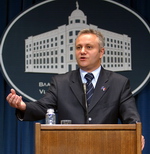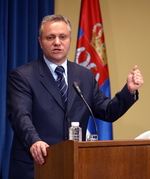Q:
A:
Second installment of debt to pensioners to be paid on July 17
Belgrade,
4 July 2006
Serbian Minister of Finance Mladjan Dinkic said today that pensioners will receive the second installment of the debt in the amount of one-quarter of their current pensions starting from July 17. He noted that 4 billion dinars have been set aside from the budget for this purpose.
Dinkic stressed in a press conference that the second installment will be the same as the first one, which was paid on December 22, 2005, increased by the 8.5% interest rate on an annual level from December 22, 2005 until July 18 this year.
He recalled that the Law on public debt stipulates that the whole debt to pensioners in the amount of 24.5 billion dinars is repaid within a three year period, i.e., in six installments until 2008.
Speaking on the salary increase to public servants, the Minister said that from July salary will be increased by 40% while the total increase of salary this year will amount to 62%.
According to Dinkic, workers in culture institutions will have ther salaries increased by between 6% and 17%, university workers and police will get a salary increase of 12%, primary and secondary school workers will get a 4% salary increase while other workers in the public administration will receive a 2% wage increase. Dinkic said that health workers will receive an increase of 48%.
Dinkic presented macroeconomic trends in the first six months of the year and explained that the budget surplus in the given period amounted to 6.9 billion dinars, nothing that its further growth is expected by year’s end.
Dinkic recalled that the first half of the year saw revenues in the amount of 218.9 billion, while expenditures totalled 212 billion. According to him, revenues in June hit a record high with a total of 2.3 billion dinars. He also said that VAT and excise payment in the last several months is getting better.
Speaking on other macroeconomic indicators, Dinkic said that the 6.3% growth of GDP in the first quarter is encouraging, and added that it is 0.7% more than in the same period last year. He also expressed expectation that total GDP growth this year will be between 6% and 7%. In reality these prognoses also show a relatively good result regarding the growth of industrial production, which during the past five months of this year was 5.9% higher against the same period in 2005, said the Minister of Finance.
Similarly, the increase in retail prices in the first six months was 5.7%, with a downward trend beginning from June, and the rate of inflation is only 0.2% higher than planned.
Dinkic said that we can count on single digit inflation, if the basic inflation rate is in line with prognoses, and a contributing factor for realising these prognoses is the current situation in the foreign currency market and the sudden growth of foreign currency reserves of the National Bank of Serbia, which are now more than $8.2 billion.
He said that Serbia needs between $2.5 and $3 billion in foreign direct investment annually. He added that such a level will secure continued and double digit export growth, and will lead to a higher employment rate.
According to Dinkic, the Decree on incentive for direct foreign investment envisages that Greenfield investments in production, services and research and development will be supported financially, for which purpose a sum of €5 million has been allocated this year, while next year the fund should be three times more.
He recalled that the Law on public debt stipulates that the whole debt to pensioners in the amount of 24.5 billion dinars is repaid within a three year period, i.e., in six installments until 2008.
Speaking on the salary increase to public servants, the Minister said that from July salary will be increased by 40% while the total increase of salary this year will amount to 62%.
According to Dinkic, workers in culture institutions will have ther salaries increased by between 6% and 17%, university workers and police will get a salary increase of 12%, primary and secondary school workers will get a 4% salary increase while other workers in the public administration will receive a 2% wage increase. Dinkic said that health workers will receive an increase of 48%.
Dinkic presented macroeconomic trends in the first six months of the year and explained that the budget surplus in the given period amounted to 6.9 billion dinars, nothing that its further growth is expected by year’s end.
Dinkic recalled that the first half of the year saw revenues in the amount of 218.9 billion, while expenditures totalled 212 billion. According to him, revenues in June hit a record high with a total of 2.3 billion dinars. He also said that VAT and excise payment in the last several months is getting better.
Speaking on other macroeconomic indicators, Dinkic said that the 6.3% growth of GDP in the first quarter is encouraging, and added that it is 0.7% more than in the same period last year. He also expressed expectation that total GDP growth this year will be between 6% and 7%. In reality these prognoses also show a relatively good result regarding the growth of industrial production, which during the past five months of this year was 5.9% higher against the same period in 2005, said the Minister of Finance.
Similarly, the increase in retail prices in the first six months was 5.7%, with a downward trend beginning from June, and the rate of inflation is only 0.2% higher than planned.
Dinkic said that we can count on single digit inflation, if the basic inflation rate is in line with prognoses, and a contributing factor for realising these prognoses is the current situation in the foreign currency market and the sudden growth of foreign currency reserves of the National Bank of Serbia, which are now more than $8.2 billion.
He said that Serbia needs between $2.5 and $3 billion in foreign direct investment annually. He added that such a level will secure continued and double digit export growth, and will lead to a higher employment rate.
According to Dinkic, the Decree on incentive for direct foreign investment envisages that Greenfield investments in production, services and research and development will be supported financially, for which purpose a sum of €5 million has been allocated this year, while next year the fund should be three times more.
The Decree will come into force next week and will be valid for three years, and has been designed according to the model used in Ireland, Slovakia and Slovenia, said Dinkic. He added that in order to qualify to compete for state support the minimum value of the investment must be €1million and it should provide at least 10 jobs.
Dinkic said that criteria for distribution of funds will be strict and firms which participate in the competition must have strong recommendations, and will be obliged to present their previous achievements.
Similarly, investors will have to submit bank guarantees in the total value of the stimulation they receive from the state, with the addition of default interest which will be security in case all obligations agreed upon in the contract with the state are not fulfilled, and in such a case the entire sum will have to be returned.
The Minister explained that investors will get money in four equal installments – the first one will be provided once a construction license has been acquired, the second at the conclusion of the sale-purchase contract or a lease contract for construction land, the third when all the necessary permits have been secured and the last one when all personnel envisaged by the investment programme have been employed.
The competition for receiving incentive funds from the state will be announced during summer, said Dinkic. He added that the committee for distribution of funds will consist of the Serbian Deputy Prime Minister and a representative each from the Ministry of International Economic Relations, the Ministry of Finance, the Ministry of Economy, and the Serbian Investment and Export Promotion Agency (SIEPA).
Dinkic said that criteria for distribution of funds will be strict and firms which participate in the competition must have strong recommendations, and will be obliged to present their previous achievements.
Similarly, investors will have to submit bank guarantees in the total value of the stimulation they receive from the state, with the addition of default interest which will be security in case all obligations agreed upon in the contract with the state are not fulfilled, and in such a case the entire sum will have to be returned.
The Minister explained that investors will get money in four equal installments – the first one will be provided once a construction license has been acquired, the second at the conclusion of the sale-purchase contract or a lease contract for construction land, the third when all the necessary permits have been secured and the last one when all personnel envisaged by the investment programme have been employed.
The competition for receiving incentive funds from the state will be announced during summer, said Dinkic. He added that the committee for distribution of funds will consist of the Serbian Deputy Prime Minister and a representative each from the Ministry of International Economic Relations, the Ministry of Finance, the Ministry of Economy, and the Serbian Investment and Export Promotion Agency (SIEPA).












